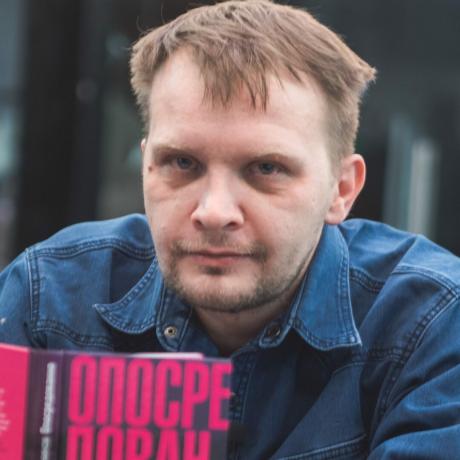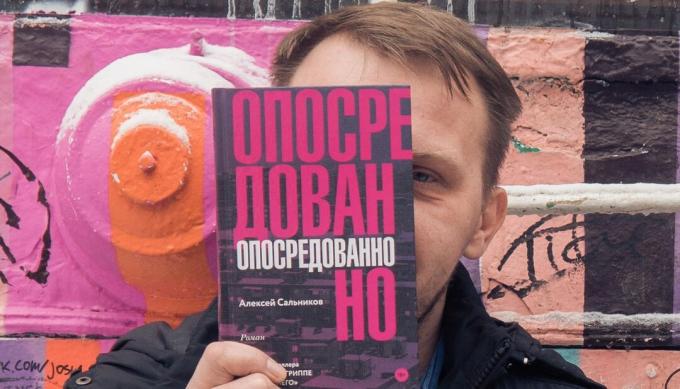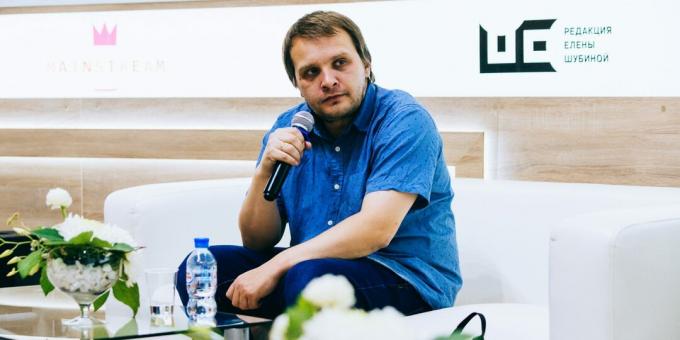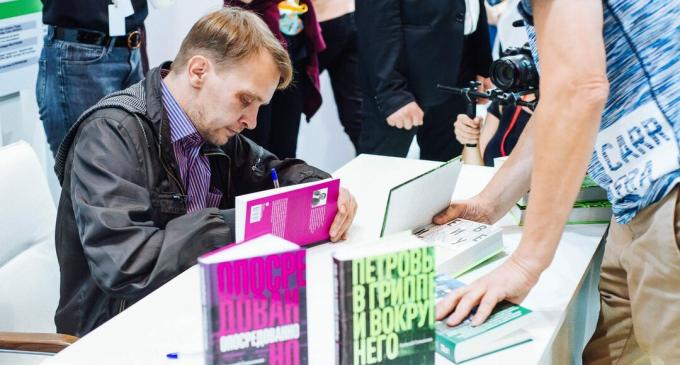“Re-read the manuscript, prepare for shame and send it to the editors”: interview with writer Alexei Salnikov
Workplaces / / January 07, 2021
The novel "The Petrovs in and around the Flu," first published in 2016, talks about a car mechanic Petrov and members of his family, who before the New Year get sick and lose the line between reality and hallucinations. This book turned the writer from Yekaterinburg, Alexei Salnikov, into a laureate of the National Bestseller Prize and a literary star. Life hacker learned from the author what the hardest part of literary work, how he had to raise money before he wrote the first book, and what writing success means.

Alexey Salnikov
Writer and poet, winner of the National Bestseller award.
"Is it possible to get rich on books - the question is not for me, but for J.K. Rowling"
- You became famous after the release of the novel "The Petrovs in and around the Flu." How was the work on the book going?
- To be honest, I don’t remember how it all happened. All that remained in my head was the green wall of our kitchen, which had been peeled off then. I sometimes raised my eyes to this wall. The idea of the novel was funny in itself, but wild: that we, even if living in the same family, sometimes do not know everything about each other. That our
child, even growing before our eyes, about whom we seem to know everything - because we know what he is watching, what books we read to him, what he eats, in the end - is still a mystery to us. Well, and another book about how close we are to each other, even very distant people. So close, no matter how far, yes.He wrote in his spare time, because he did not believe in the success of the novel. It was just that I myself was curious to finish and see the invented story in more detail. Then I was engaged in writing for money: I made up descriptions of goods, translated a little, including articles, altered coursework until completely unrecognizable.
- Did you work as someone else besides this?
- Oh, whoever did not work. Even the finisher had to. He was a watchman here and there, poking around in the undercarriage of cars, worked in a boiler room, even grew up to be a shift foreman. But this brigadier was more likely to shove responsibility onto the youngest.
At the same time, I have been writing since childhood, so I have never seen myself as anyone except a writer. I always perceived any work from the point of view of convenience or as a kind of literary material. You can read and write in one place, but not in another. That's all the convenience.
- Surely after the success of "Petrovs in and around the flu" there was a slight dizziness. How did you manage to defeat him and force yourself to write the following books?
- You have to win yourself every day. Then it turns out that he won himself in vain and it would be better lying on the couch And I was in no hurry, because rewriting what I had already sketched, deleting whole chunks of text is quite painful - it's easier to rewrite everything from scratch. And these year or two in one text - repeating it with variations, wondering how best - is rather tiresome for heads, because the idea is with you all the time, you carry it around with it, you even seem to go to sleep, but you still twist it like that syak.
- How long does it take to work on one book?
- If you count from the moment when the idea arose, to the point at the end, then the whole thing takes several years. "Petrovs" were invented for about seven years, probably. For two or three years I looked at the first page and a half and still did not know how to approach. Something was missing.
"Department" was also spinning in my head while walking the dog through the woods. "Indirectly" so, in general, from adolescence was drawn up in a book. It feels like he started writing poetry only to come up with this novel, at least partially representing what the life of the average poet is.
- you toldthat the novel "Section" was sometimes written drunk. Does alcohol help you with your books?
- Not sometimes, but only once. Alcohol doesn't work. On the contrary. If you wake up in the morning after hanging out with friends, you want to drink water, although it will only get worse. You want to smoke, and it will only get worse, and you come to your senses all day. Nausea, among other things, and not really nauseous, but either nauseous, or not. This is even worse. What kind of help is there in the work?
- What helps? What knowledge do you need to become a writer? For example, you did not graduate from a university, you did not mention literary courses, only a poetry studio in Nizhny Tagil.
- Literary courses, in principle, were. It was a seminar by Yuri Kazarin and Yevgeny Kasimov at the Yekaterinburg State Theater Institute. The course "Literary work", or "Literary worker". But even here they did not manage to finish anything. Although everything very quickly developed into friendship with these teachers, and this friendship continues to this day.
The literary work began immediately, which is interesting. Publications appeared, it became entertaining to poke around in your own texts in order to compile another selection, surprise someone with another poem. For some time, there was an unconditional understanding of what is good and what is bad in the text. Several years literally dropped out of my life while I was engaged in this sorting of words. It seems like it was worth it.

And as for education, I don't know, honestly. I saw a collective collection of academicians of the Ural Branch of the Russian Academy of Sciences. It is clear that the participants in this collection were not without education, but this did not at all affect whether they had interesting poems or not. Most do not. You will not believe: it was about the fact that mom needs to be loved, because she gave birth to you in agony, and so on.
Literature is such a thing in which the longer you are, the less you understand how it works.
Therefore, the most wonderful time for creativity is youth, because this is a period of unconditional self-confidence.
- Can you say about yourself now that you are a professional writer and literature feeds you?
- Yes, that's right.
- How has your lifestyle changed after the books were published?
- Not very much, so the fee from one novel was enough for repairs and a quiet life. And for royalties from three novels, there is enough for an even quieter life. As for part-time jobs, I willingly write something, if asked, I go somewhere, if invited. But this is not from the category of "have to", I am happy to communicate with people.
- Can you get rich writing books?
- This question is not for me, but for J.K. Rowling.
"If you want to tell the reader something, repeat it several times, preferably using a capslope"
- How did your love of literature begin?
- It all started with a geographical atlas. I tormented my relatives for a long time, asking how read that letter or the other. They did not attach much importance to this. And one day my aunt came to have lunch and, perhaps, choked when she heard from the next room the words that she did not expect from a preschooler: "Liechtenstein, Berlin, Barcelona."
Then the love of reading developed from the books that my mother chose and slipped me. He especially fell in love with literature when he broke his leg at the age of seven and first lay on the hood, and then walked in a cast. Love could not help but develop, because I was firstly subscribed to the magazine "Vesyolye Kartinki", and then in bulk "Murzilka", "Pioneer", "Bonfire", "Young Naturalist", "Young Technician", where the heading of science fiction was traditional. I went to the library. At a time when there was not a lot of entertainment in the village near Nizhniy Tagil, it was difficult not to read.
Among his favorite books was Leo Tolstoy's The Lion and the Dog. She measured his sentimentality - checked, tears will come, they will not. We walked all the time. I also liked "Adventure Seller" by Georgy Sadovnikov, "Twelve Chairs" by Ilf and Petrov, "Ants do not give up "Ondřej Sekora," Muff, Polbootinka and Mokhovaya Beard "by Eno Rauda," The Old Man and the Sea "by Ernest Hemingway.
- How did your relatives react to your desire to become a professional writer? How are your books reviewed and do they recognize themselves in them?
- When I was a child and a teenager, loved ones thought it was kind of a fool. Well, you know, when a child is asked what he is going to become when he grows up, and he answers, say, an astronomer, and the relatives are like: "Oh-oh-oh!" - and nobody believes. Now the situation has changed a bit. Sister and nieces seem to like it, some relatives in Estonia - too, but I don't know about the rest.
A wife and son is a different story. This is nevertheless done in some way jointly, like the study of the wife and son, the work of the wife, moving, dog death, troubles and successes. The wife and friends sometimes recognize some things borrowed from life. But that's okay.

- The website of the publishing house AST says about you: “He considers his wife the most important critic of his work and completely trusts her assessment”. Did you rewrite something if your wife didn't like it?
- Yes, in the same "Petrovs" Aida had to be made more explicit than he was in the first handwritten edition. Since then, I have firmly learned the unwritten rule: if you want to say something to the reader, repeat it several times, preferably using a small cap. But when Lena didn’t like that the heroine “Indirectly” was accepting her ex-husband back, I didn’t let her interfere, because what doesn’t happen between people.
As soon as I finish writing the manuscript, I immediately give Lena to read, but in the process, it happens that I discuss something. Not only with her, with friends I also start talking about topics that may be useful. Then they remember: they say, this is what we talked about, this too. Lena also notices this, she really likes it, she can best see where this or that episode came from. This is probably one of the several advantages of living with a writer.
"Heroes start to conduct dialogues that you can't even imagine - they appear themselves"
- How is your working day organized? Where do you prefer to work, what tools do you use when writing?
- I wake up, wash, walk my dog, go for cigarettes, my floors, sit down to work. Some of the items in the morning routine sometimes change places. Of the tools, perhaps Word.
- How do you work on the text?
- Oddly enough, this is partly something acting. You invent a character, compose adventures for him, try to relive these adventures for him, write down. You cross out the uninteresting.
As for the style, I really like the tongue-tied language, which is close to colloquial speech, but I do not think that this is exactly my style. Now many people write like this.
There is still nowhere without a plan, it helps to look at what you are writing, as if from above, to see a fragment of the text you are working on, part of a lot of work.
Whatever one may say, but a novel is not a stack of stories piled on top of each other.
There are no tricks here. Remember, at school they gave the task - to make a plan for the story of the classic. Here the situation is the opposite: it is required to make a plan for a work that does not yet exist, and according to it, as it were, to recreate a certain text from emptiness. I'm just making a list of chapters, a reminder of what should happen there. Then I describe the example events in the chapter point by point.
If something changes in the process of writing, then fine. While I am writing the plan, I correct it quite a lot, leave it alone, I think, but even after that, some changes still occur. This is a fairly fluid process. The number of points in the plan is different: I roughly estimate how many chapters in the novel are required, how much should happen inside the chapter.
- What is harder in the work of a writer: writing a draft of a book, inventing characters and a plot, or self-editing?
- Self-editing is unambiguous. The book seems to be finished, but not. The most difficult thing about self-editing is that when you start rereading, the same thoughts come to mind that arose while writing. And in this reverie, you involuntarily jump over those places that the editor will notice.
And when you come up with, make a plan, write - for yourself the text is a kind of surprise, surprises with finds, jokes. Heroes, gaining personal traits, are taken to lead dialogues, which you can't even invent - they appear on their own.
Such an attraction that I recommend to everyone.
- What do you usually cut out of the text when working on a book? What advice would you give to those who struggle with editing their texts?
- I remove what I do not like, add what seemed interesting. But it doesn't have to be an endless process. You can reign forever, and still there is some stupidity in a long text, I assure you. You just need to know that you are not writing dictation, but history. Re-read it a couple of times, pull yourself together, prepare for shame and send the manuscript to the addresses, slip it to publishers and editors at any opportunity.
- Dovlatov tried to ensure that all words in one sentence begin with different letters, and the same words do not repeat on the page. Do you have any editing rules?
- I am more oppressed by the usual, blurry phrases like “white as a sheet”, “blue as the sky”, “red as blood”, “golden autumn”. Jars when pick is visible synonymso that the word does not repeat itself in the text. Slightly encouraged by the need to come up with some actions in the dialogues. English-speaking people have said, said, said, said, said. In our country, everyone is “scratching”, “nodding,” “coughing into a fist,” “squinting,” and so on. But all the same, the hands themselves stretch out to insert some action between the words of direct speech.

- Do you write every day?
- When I know what to write about, then yes, every day. And if I don’t know, then I can come up with what and how for several months. Because if I don't like it, then what's the point in expecting the reader to suddenly pop in? Better to stop and think. No one is in a hurry, contrary to the myths that there are some onerous contracts, and if writer did not meet the deadline, strong guys from AST or Livebook come to him and harass him with baseball bats.
- The film "The Petrovs in the Flu" should be released this year. Were you involved in the film? Do you like the choice of Chulpan Khamatova and Semyon Serzin for the main roles?
- They seem to be going to insert me into the frame in some way, but I am successfully slipping away due to my busy schedule.
And yes, the choice that Kirill Serebrennikov made when he was looking for actors for the main roles suits me perfectly. But even if it didn’t suit, the director, in the end, knows better what the visual range should be, how people should look in the frame, how and what they should play.
“Most of the people involved in literature, in fact, ruin their lives. They do what brings nothing but mental work "- your quote from one interview. Do you think it's not easy for a writer to succeed?
- Success is another measure. Was Platonov a successful person? Or maybe Tsvetaeva? But at least they are remembered. And hundreds or thousands of people, relatively speaking, lived about the same not very cheerful lives, they also studied literature and simply sank into emptiness, as dozens of modern writers, even very popular now.
Both in the past and now it inevitably happens. From time to time, the memory flashes: "And where, in fact, is now a certain N, just a couple of years ago, annealed?" And that's it, no N. Whole musical groups - fucking! What can we say about such unsociable creatures as writers. A hundred years from now? And after two hundred? Several names, familiar only to specialists.
If you take a close look at what is now taken for success or has always been accepted, then this is apparent well-being minus all the troubles unknown to the public.

- Do you consider yourself a successful writer?
- Yes, I am quite a successful writer. And there are dozens, if not hundreds, of successful writers in Russia. They work in different genres and are successful in them. I watch my Facebook feed - a notable interesting book comes out almost twice a week. Almost each of them is an event for this or that reader.
Top books from Alexey Salnikov
"Provincial Essays", "Lord Golovlevs", Mikhail Saltykov-Shchedrin
The multi-genre novel "Provincial Essays" is masterfully made, magical, more relevant than, oddly enough, Sorokin's "Sugar Kremlin", more fun than most modern satire. In the 19th century, they believed in the power of literature and cartoons, and now it is more an attempt to make like-minded people laugh than a desire to change something in the reader's worldview. More a kind of antics over the news story, which will be forgotten in a couple of weeks, when a new rattle appears in the next pseudo-political world, which will fill the Facebook feed with re-posts. In the end, the novel "Provincial Essays" is complete, that is, the existence of a cavalcade of heroes is skillfully explained by the last phrase of the large text.
"The Enchanted Wanderer", Nikolay Leskov
Leskov's heroes are interesting in that for all the seeming wretchedness, sometimes isolation from the world, the most pitiful of them are sometimes stronger than most modern people. They surprise with a wonderful quality: they know exactly who they are, what they believe in, they can confirm their faith with quotes from the Gospel. Even the seeming loss is still a kind of goal-setting for them.
"Information", "Money", Martin Amis
Martin Amis's books are a very honest piece, full of wonderful details from the life of a middle-aged person. Among other things, there is in it a share of such kitchen mysticism, this intuitive sense of karma, which, it turns out, surprisingly brings us closer to the British. You read and understand that we are not all that different, people in this world.
Read also🧐
- "The challenge of modern medicine is to help you live to see your Alzheimer's." Interview with cardiologist Alexey Utin
- "Voice work is like fitness." Interview with Olga Kravtsova, co-founder of the "Cubic in a cube" voice acting studio
- “My installations - plan, distribute, count”. Interview with Polina Nakrainikova, editor-in-chief of Lifehacker



